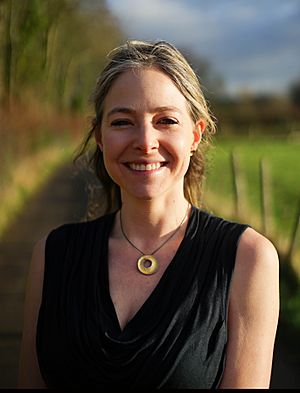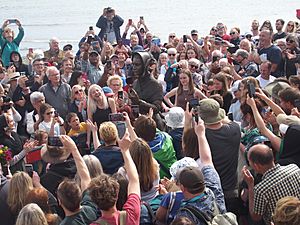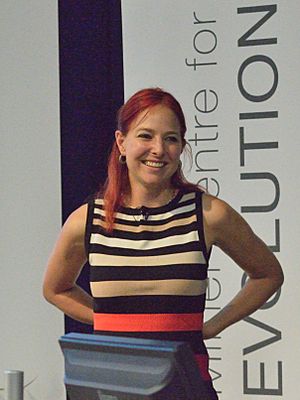Alice Roberts facts for kids
Quick facts for kids
Alice Roberts
FRSB
|
|
|---|---|

Roberts in January 2016
|
|
| Born |
Alice May Roberts
19 May 1973 Bristol, England
|
| Education | The Red Maids' School |
| Alma mater | University of Wales (BSc, MB BCh) University of Bristol (PhD) |
| Known for |
|
| Spouse(s) | David Stevens (m. 2009) |
| Children | 2 |
| Scientific career | |
| Fields | |
| Institutions | University of Birmingham National Health Service British Broadcasting Corporation University of Wales University of Bristol |
| Thesis | Rotator cuff disease in humans and apes : a palaeopathological and evolutionary perspective on shoulder pathology (2008) |
Alice May Roberts (born on May 19, 1973) is an English scientist, TV presenter, and author. Since 2012, she has been a professor at the University of Birmingham. She helps make science interesting and easy to understand for everyone. She was also the president of a charity called Humanists UK from 2019 to 2022. Now, she is a vice-president for them.
Contents
Early Life and Education
Alice Roberts was born in Bristol, England, in 1973. Her dad was an engineer who designed airplanes, and her mom was an English and arts teacher. She grew up in a part of Bristol called Westbury-on-Trym. She went to a private school there called The Red Maids' School.
When she was 15, in 1988, she won a drawing competition on the TV show Blue Peter. Her picture and the presenters were on the front cover of the Radio Times magazine.
Roberts studied medicine at the University of Wales College of Medicine (which is now part of Cardiff University). She finished her medical degree in 1997. She also earned a science degree in anatomy, which is the study of the body's structure. In 2008, she completed her PhD in paleopathology. This is the study of diseases found in ancient human remains.
Research and Career
After medical school, Roberts worked as a junior doctor in South Wales for about 18 months. In 1998, she stopped working as a doctor. She started working at the University of Bristol as an anatomy demonstrator. This means she helped teach students about the human body. She became a lecturer there in 1999.
She spent seven years working on her PhD, which she finished in 2008. At the University of Bristol, she taught about anatomy, how bodies develop (embryology), and how humans have changed over time (physical anthropology). She also researched ancient bones (osteoarcheology) and diseases in old human remains. In 2009, she said she wanted to become a professor of anatomy.
From 2009 to 2012, Roberts was a visiting fellow at the University of Bristol. She also worked as the Director of Anatomy for the NHS Severn Deanery School of Surgery from 2009 to 2016. She was also an honorary fellow at Hull York Medical School.
In 2012, Roberts became the first Professor of Public Engagement in Science at the University of Birmingham. This role involves helping the public understand science better.
She has been on the advisory board for the Cheltenham Science Festival for 10 years. Since 2018, she has also been on the advisory board for the Milner Centre for Evolution at the University of Bath.
In 2016, Roberts wrote about the "aquatic ape hypothesis." This idea suggests humans evolved near water. She said it was not supported by enough evidence. She believes that science needs strong proof, not just ideas we wish were true.
In 2018, Roberts and Aoife McLysaght gave the Royal Institution Christmas Lectures in London. These are famous science talks for young people. Roberts was also the president of the British Science Association from 2019 to 2020. In 2021, she presented a 10-part radio series called Bodies on BBC Radio 4. It was about the history of the human body.
Television Career
Alice Roberts is well-known for presenting science and history TV shows. She was a regular presenter on the BBC series Coast, which explored the geography and environment of coastlines.
Her first TV appearance was in 2001 on Time Team Live. She worked as a bone specialist on many episodes, including the spin-off series Extreme Archaeology. In 2006, she helped present Big Royal Dig, a Time Team special about royal palaces.
From 2007, Roberts wrote and presented a BBC Two series called Dr Alice Roberts: Don't Die Young. This show focused on anatomy and health. In 2009, she presented The Incredible Human Journey, a five-part series about human evolution and early human migrations. Later that year, she co-presented A Necessary Evil?, a documentary about the Burke and Hare murders.
In 2010, she presented Wild Swimming on BBC Four. She also presented Digging for Britain, a BBC Two series about archaeology. Roberts explained that the show aimed to show British archaeology as it was happening. The show was very popular and aired its twelfth series in 2025.
In 2011, she presented a BBC Horizon documentary called Are We Still Evolving?. She also presented How to Build a Dinosaur on BBC4. Later in 2011, she presented Origins of Us on BBC Two. This series looked at how the human body has changed over millions of years of evolution.
In 2012, Roberts presented Woolly Mammoth: Secrets from the Ice on BBC Two. She also appeared in Prehistoric Autopsy with Dr George McGavin. This series discussed the remains of early humans like Neanderthals. In 2013, she presented the BBC Two series Ice Age Giants. In 2014, she was a presenter on the Horizon program Is Your Brain Male or Female?
In 2014, she presented Spider House. In 2015, she co-presented The Celts: Blood, Iron and Sacrifice with Neil Oliver. She also wrote a book to go with the series. In 2016, she co-presented Food Detectives, which looked at food nutrition. She also presented Britain's Pompeii: A Village Lost in Time, about an ancient Bronze Age settlement.
In 2017, she presented The Day The Dinosaurs Died. From 2018, she presented the Channel 4 series Britain's Most Historic Towns. This show explored the history of British towns. It had a second series in 2019 and a third in 2020.
In 2018, she presented King Arthur's Britain: The Truth Unearthed on BBC Two. This documentary looked at new discoveries about Britain's past during the Early Middle Ages. In December 2018, she presented the Royal Institution Christmas Lectures again, titled Who am I?.
In 2020, Roberts was a guest on BBC Radio 4's The Life Scientific. She also co-presented The Big Dig for the BBC. In 2021, Roberts presented Stonehenge: The Lost Circle Revealed on BBC Two. This documentary was about the bluestones of Stonehenge.
In 2022, Curse Of The Ancients with Alice Roberts premiered on Sky History. In October 2022, Roberts presented Royal Autopsy, a two-part series on Sky History. This series looked at the deaths of Queen Elizabeth I and King Charles II. A second series was made in 2023, which aired in April 2024. It examined the deaths of Queen Anne, Queen Mary I, King Henry IV, and King George IV.
In 2023, Roberts presented Fortress Britain with Alice Roberts on Channel 4. She also presented Ancient Egypt by Train with Alice Roberts. In May 2024, Roberts presented The Lost Scrolls of Pompeii: New Revelations on Channel 5.
Awards and Honours
In 2011, Alice Roberts was made an honorary fellow of the British Science Association. She also became a fellow of the Royal Society of Biology. In 2014, the Science Council chose her as one of the UK's top scientists. She was also the President of The Association for Science Education in 2014.
Roberts has received special honorary doctorates from several universities. These include Royal Holloway, University of London, Bournemouth University, the Open University, and the University of Leeds. She also received an honorary Doctor of Medicine from the University of Sussex and an honorary Doctor of Education from the University of Bath.
In 2019, Cardiff University gave her an Honorary Fellowship. In 2015, she was named "British Humanist of the Year." This was for her work in promoting the teaching of evolution in schools. Her book, The Incredible Unlikeliness of Being, was shortlisted for the Wellcome Book Prize in 2015. In 2020, Roberts won the Royal Society David Attenborough Award.
In May 2022, Roberts helped unveil a Statue of Mary Anning in Lyme Regis. This statue honored the famous paleontologist Mary Anning.
Personal Life

Alice Roberts lives with her husband, David Stevens, and their two children. They have a daughter born in 2010 and a son born in 2013. She met David in Cardiff in 1995. She was a medical student, and he was studying archaeology. They got married in 2009.
Roberts is a pescatarian, meaning she eats fish but not other meat. She is also an atheist. She was the president of Humanists UK from 2019 to 2022 and is now a vice president. She has spoken out against state-funded religious schools. This is because her children were sent to a faith school due to other local schools being full.
Roberts enjoys many hobbies, including watercolor painting, kayaking, surfing, and wild swimming. She also likes cycling, gardening, and playing pub quizzes. She helps organize the Cheltenham Science Festival. She also works on school outreach programs at the University of Bristol. In 2007, she hosted a charity dance show to raise money for CLIC Sargent.
When filming the first series of Digging for Britain in 2010, Roberts took her baby daughter with her. In March 2024, Roberts was a guest on BBC Radio 4's Desert Island Discs. She chose songs like "Monkey Gone to Heaven" by the Pixies and "Sugar" by System of a Down.
See also
 In Spanish: Alice Roberts para niños
In Spanish: Alice Roberts para niños
 | Bessie Coleman |
 | Spann Watson |
 | Jill E. Brown |
 | Sherman W. White |


